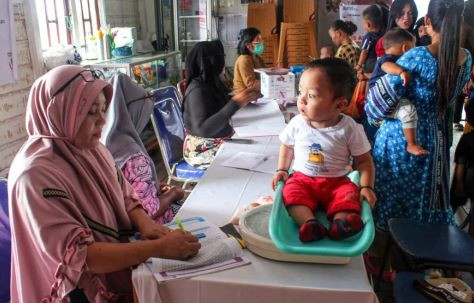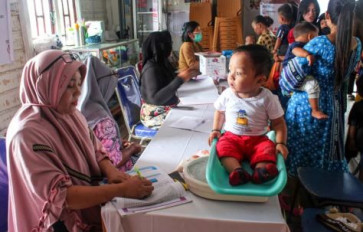Popular Reads
Top Results
Can't find what you're looking for?
View all search resultsPopular Reads
Top Results
Can't find what you're looking for?
View all search resultsOptimizing diabetes care for Indonesian children
Amplifying care access and achieving optimal care for children with diabetes requires active involvement from the government and the broader community.
Change text size
Gift Premium Articles
to Anyone
 Health check: Community-based health workers in the fishing village of Sebrang Belawan in Medan, North Sumatra, weigh a toddler during a routine check on Jan. 16, 2023. More than 1,200 children were diagnosed with type 1 diabetes in 2017-2019, mostly from underprivileged and less educated families. (Antara/Yudi)
Health check: Community-based health workers in the fishing village of Sebrang Belawan in Medan, North Sumatra, weigh a toddler during a routine check on Jan. 16, 2023. More than 1,200 children were diagnosed with type 1 diabetes in 2017-2019, mostly from underprivileged and less educated families. (Antara/Yudi)
D
uring Diabetes Awareness Month, particularly on World Diabetes Day, which falls Nov. 14, we are reminded that diabetes is a long-term or “chronic” disease characterized by elevated blood sugar levels that impacts not just adults but also children and adolescents.
Unfortunately, awareness and access to diabetes care for the younger demographic are notably limited in Indonesia.
While Type 2 diabetes (T2D) is mainly diagnosed among adults, Type 1 diabetes (T1D) constitutes over 90 percent of childhood-onset diabetes. Individuals with T2D have insulin, but their bodies cannot effectively use it. Meanwhile, T1D is an autoimmune process that attacks the pancreas, resulting in little or no insulin production.
Diabetes advances from a symptomless stage with elevated blood glucose level to preventable, life-debilitating complications like kidney failure, impaired vision, nerve damage, stroke and heart disease.
Children with T1D meticulously manage their diet and activities to sustain normal blood sugar levels. Most Indonesian children with T1D use lancets and strips to check blood glucose and administer insulin multiple times daily. This vigilance helps prevent diabetes progression and acute complications, particularly excessively low blood sugar and diabetic ketoacidosis (DKA).
DKA is primarily linked to T1D, and when uncontrolled, could result in severe dehydration and high body acidity, even leading to death, while mismanaging low blood sugar might cause a coma.
Children diagnosed with diabetes often face psychological challenges, including discomfort from multiple injections, anxiety and feelings of being overwhelmed or frustrated due to lifestyle adjustments and diabetes-related complications. They might also experience embarrassment and negative social reactions when managing diabetes in public.


















